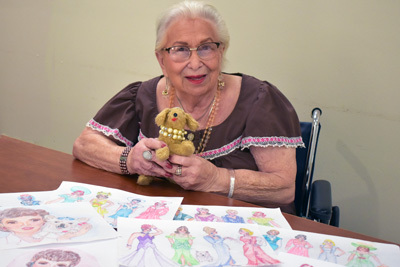Fashion Designer Marilyne Holm Interview


Fashion Designer Marilyne Holm Interview
As Fashion Week 2021 Arrives in New York, We Celebrate a Designer Who Spent Decades in the Fashion Industry and Who Is Still Inspiring and Setting Trends as a Resident of the Jewish Home.
Marilyne Holm, at 92 years of age, personifies the spirit of the Los Angeles Jewish Home. From the moment she greets you in the Taper facility on the Grancell Village campus, her warmth and smile make you feel like you've known her for years.
Born Marilyne Levy, she grew up with her parents and one brother in Sheboygan, Wisconsin. Marilyne describes it as "not necessarily a great place at the time for a Jewish kid to grow up."

Marilyne was one of only four Jewish students at her high school. Her love for sketching started well before her high school years. She actually recalls sketching at the age of three, though throughout her childhood, she was only able to indulge her passion once she had accomplished her many chores.
She married young, to a florist. Soon, she was pregnant with their son Christopher. As a child, Christopher asked his mother why she chose "Christopher" for a Jewish boy's name. She explained what a beautiful name she thought it was when hearing the childhood classic, Winnie-the-Pooh (Pooh's childhood best friend is the loving boy Christopher Robin). When it came time for Christopher to pick his own name at his Bar Mitzvah, he selected the more traditional "Baruch."
Christopher's parents eventually divorced, making Marilyne a single mom working full time, but she always made time for him, even volunteering for his Cub Scout troop.
She never remarried. However, when asked if she ever fell in love again, she gets a twinkle in her eye, and without missing a beat says, "Several times … but when you are a mother, that is the most important thing." She was protective of her son and the potential impact a new man might have on him.

Throughout all of life's changes, Marilyne's love of sketching never wavered. She studied at an art school in Chicago while also working at upscale department stores such as Marshall Fields and JW Robinson. It was in art school that she experienced discrimination: One teacher told her she really didn't need to study or do well, since Jews were taking over the fashion industry. At the time, she didn't know much about fashion, but the remark pushed her to do her best, and she ended up winning the major class competition.
All of her time working in department stores furthered Marilyne's knowledge of what clothes look best on a woman. Though she'd come to Los Angeles to be closer to the West Coast garment industry, this single mom still needed to break into the design field. She dove right in, hitting the pavement and going from place to place in the fashion district trying to get into the business. Eventually, someone gave her a chance.
From there the creative juices continued to flow. At one job, Marilyne and her colleagues noticed they kept making matching shirts and skirts. Suddenly, it occurred to them: Why didn't they just put a shirt and a skirt together in one garment to make a shirtdress? From then on, they were at the forefront of this very popular fashion style that is still widely embraced today.
Another day, proving good can come from adversity; she accidently burnt the bottom of a sleeve. Not wanting to waste the fabric, she rolled it up. Her boss loved the look so much; they successfully sold them that way from that point on.
Today, Marilyne can look back on two and a half enjoyable years at the Jewish Home. Before taking up residence here, she lived in L.A.'s Miracle Mile area.
When describing her arrival at the Jewish Home, she admits that, at first, she was a bit unsure. Then, she started touring the campus and realized how beautiful the grounds are. Once she had a meal, she said, "Well, this is good!"
The benefits kept on coming. After hearing there was a beauty shop right here on the campus, she asked, "Well, do they do back combs? Because that's how I have my hair styled." The answer was "yes"—and when she heard the low price, she was amazed.
Soon after, Marilyne saw the activities room, with its reams and reams of cloth, and she knew she had found her place. Today, she has become very well-known at the Jewish Home for a different kind of design: the sewing of adorable little stuffed dogs that bring joy to all who see them. The dogs are special. Boy dogs don a yarmulke, and female dogs wear babushkas. Marilyne's special stuffed dog, named Mendel, sports a beautiful pearl bracelet as a collar. She jokes Mendel "stole" it from her. By her estimate, she has made hundreds of the little friends since coming to the Home. One of her ongoing passions is teaching others to make them, and she points out that the activity is great for the mind and for maintaining dexterity.
When asked how she has managed to remain so upbeat, particularly during this past challenging year, Marilyne shares that it has been difficult—but that she just gets up each day, puts her make-up on, and makes a point to say "Hi" and "How are you?" to others. She doesn't mind if they don't answer, as long as she's doing her part to try to make them happy.
Reflecting on her time at the Jewish Home, Marilyne says it's easy to encapsulate how she feels. "This place is God's blessing," she enthuses. "It makes you feel good."